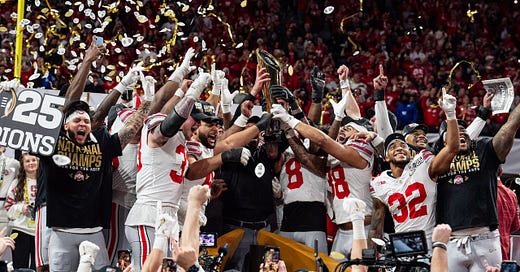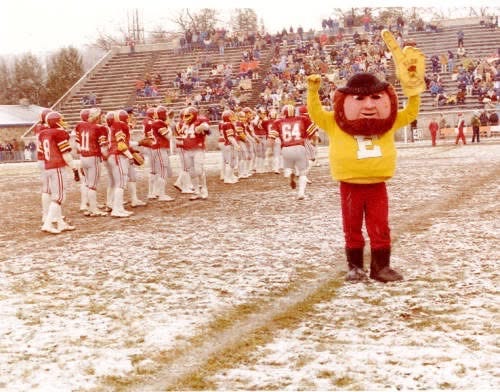Did God want Ohio State to win?
After the Buckeyes’ 34-23 victory in last night’s first-ever College Football Playoff National Championship, Notre Dame quarterback Riley Leonard spoke on the bond he observed between both teams.
“Us and Ohio State were the two teams who praised Jesus Christ the most,” said Leonard in his post-game press conference after the loss. “I think we strengthened each other in our faiths through coming to this game and competing against each other.”
Leonard added, “I’m happy to see godly men come out on top no matter what the circumstance is.”
It’s hard to ignore that many of Ohio State’s star football players are devout Christians and very outspoken about their faith.
Last night, starting quarterback Will Howard made a point of thanking his “Lord and Savior, Jesus Christ” in his post-game interview. After losing to Michigan at the end of the regular season, some Ohio State players opted for praying instead of fighting when a scuffle broke out that led to police pepper-spraying athletes from both teams.
Ahead of this season, Buckeye standouts—including running back TreVeyon Henderson and wide receiver Emeka Egbuka, who became Ohio State’s all-time receptions leader last night—hosted what they deemed a “Jesus revival” on the university’s campus.
As part of the event last August, they baptized more than 50 students. Campus celebrities Henderson and Egbuka shared their testimonies while bystanders looked on—some even peering through their dorm windows.
The links between American football and evangelical Christianity are long-standing, just as violence and the gridiron are nearly inseparable. I consider my own alma mater, Elon University (formerly Elon College), which had the “Fightin’ Christian” as its mascot for nearly 80 years starting in the 1920s. Elon retired the mascot in 2000 and recently inducted the fan favorite into the university’s Athletics Hall of Fame.
I played football at a Southern Baptist high school right outside of Charlotte, North Carolina. Me and my teammates saw ourselves as ambassadors for Jesus Christ. When we won, we glorified God. When we lost, we glorified God. In our understanding, we were playing for something—or someone—bigger than ourselves. And although we didn’t say it, we secretly hoped our faithfulness might result in greater success.
Whether God cared or not is beyond me, and I don’t know if I’m best suited to answer that question seeing as I left church behind quite some time ago. My grace for these institutions dissipated as they boasted their proximity to celebrities while being loudly silent about their hateful policies, which often target women and queer people.
I used to live for athletes’ public displays of godly affection. Now, I smirk at the strategic thinking behind using sports and media apparatuses as platforms for proselytization. In other words, if we preach it, they will come.
The invocation of Jesus’ name in American football is to be expected. And still, I question what it means in a country where the perceived betrayal of his name can be the thing Christians blame when wildfires ravage Southern California.
Or on Ohio State’s campus where three dozen people were arrested last April for organizing an encampment protest against the genocide of Palestinians in Gaza only a few months before the athletes’ courtyard revival.
We live in a country of contradictions—which brings me back to my original question: Did God want Ohio State to win? Or do we determine favorites, leaving a trail of losers in our wake?
Thank you!
I appreciate you reading! If you enjoyed, please share it with someone special.
Was this forwarded to you? Sign up here to receive my next newsletter directly in your inbox.
Support the newsletter: If you’d like to support my work, consider becoming a Paid subscriber to Feels Like Home or simply buying me a coffee.
Stay connected: For more content and updates, visit my website or follow me on Instagram, Threads, and LinkedIn.







There is a whole thread in my book about football as America’s religion, gameday Sunday as some people’s church, witnessing Hail Marys of another kind. Funnily enough, it centered on football culture in Ohio! This adds another dimension to that, and I appreciate this thinking so much. Christianity is threaded through so much of our sports culture, though it manifests slightly differently in different sports. Football is its own thing!
as a scholar immersed in religion, this writing blesses me. I've thought similar things, but the way you voiced them leaves me very open and curious and I'm glad of it. phew.